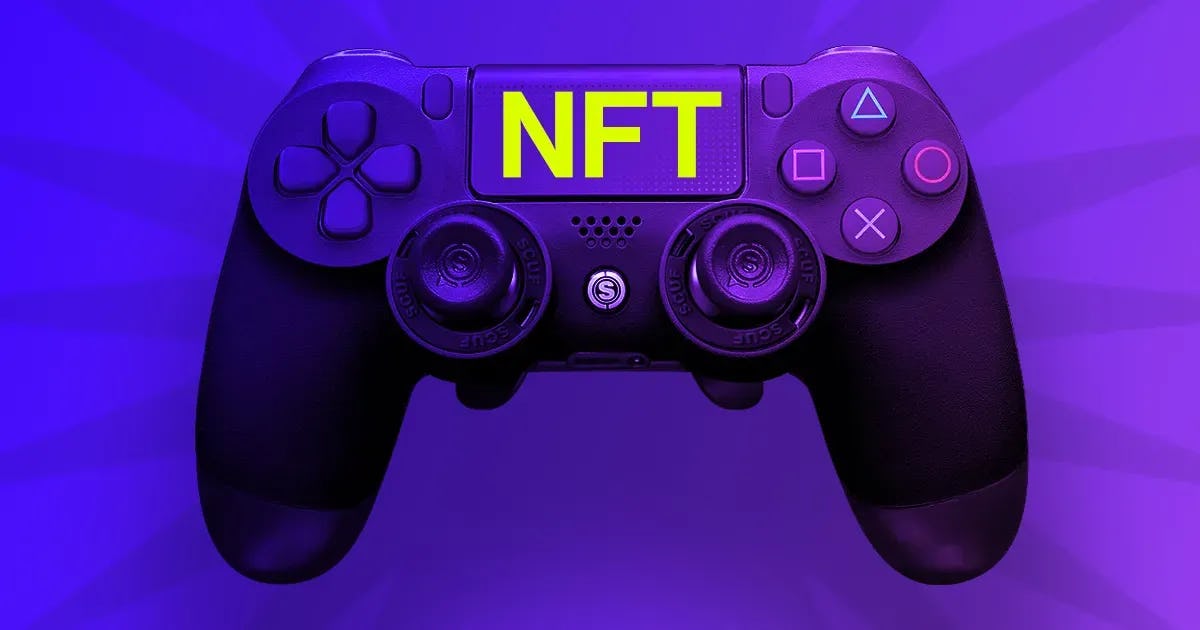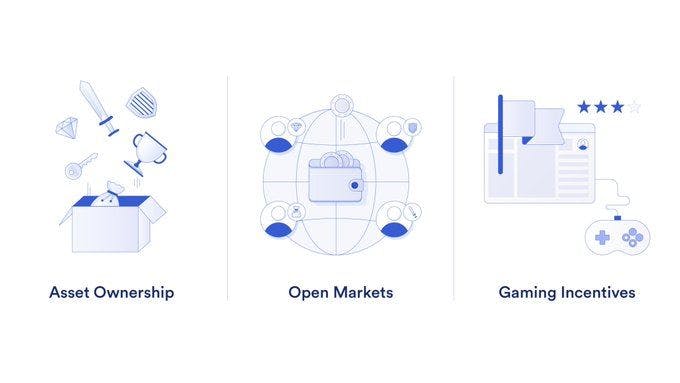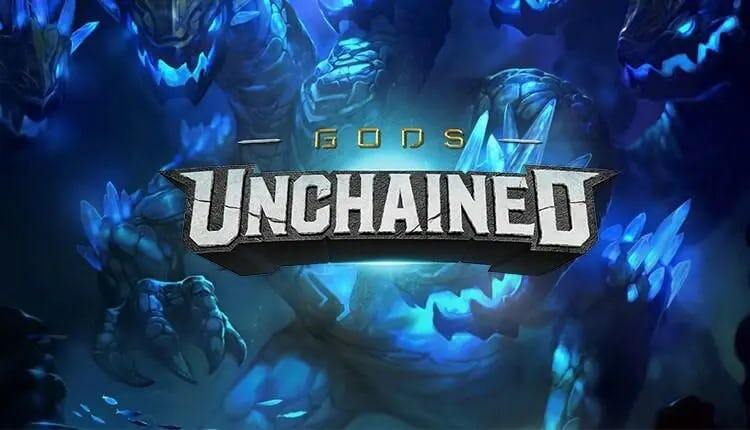What are NFT Games?
Everything you need to know about NFT games. Discover the benefits of sovereign ownership, interoperability, and new monetization models. Explore examples like Gods Unchained, Dookey Dash, and Loot.

Eliza Crichton-Stuart
Head of Operations

NFT games, or Non-Fungible Token games, are video games that integrate NFTs as a fundamental aspect of their gameplay and economic systems. NFTs, or Non-Fungible Tokens, are unique digital assets powered by smart contracts and blockchains, each possessing a distinct identifier, making them irreplaceable.
Over the years, NFTs have gained widespread popularity through web2-native mediums including the popular social platform Reddit and the Starbucks app, just to name two. Moreover, major players in the gaming industry, including Square Enix and Ubisoft, are now exploring NFT technology and its beneficial integration within video games.
In this article, we explore the world of NFT gaming, where blockchain, smart contracts, and NFTs redefine the traditional gaming landscape. From major industry players to a growing community of pioneers, discover the transformative potential in NFT games. We also cover how popular web3 titles like Gods Unchained, Dookey Dash, and Loot Project harness and exemplify this transformative trend.

"NFT games are video games that use NFTs as a core part of their gameplay and economy."
What Are NFTs?
NFTs, or Non-Fungible Tokens, are 1-of-1 tokens generated by smart contracts and blockchain technology. The uniqueness of each NFT, coupled with blockchain's digital ownership, has expanded their applications across art, gaming, and finance. Unlike fungible tokens, no two NFTs are alike, offering a new level of digital ownership.
Benefits of NFT Games
(1) Sovereign Ownership
In traditional gaming, players lack true ownership of their in-game items, currencies, or achievements. These digital assets are housed on centralized servers controlled by game publishers, developers, or companies, leaving them susceptible to being revoked at any time and confined to in-game use only.
NFTs, however, empower players with "sovereign ownership" of their digital assets, mirroring the ownership dynamics of physical items. These assets become the players to possess, enhance, and trade as they wish. This genuine ownership fosters a heightened level of player immersion and engagement, akin to the intrinsic human tendency to collect physical items such as rare coins, stamps, cards, and memorabilia.
Before the advent of NFTs, creating a digital collectible was a challenge due to the impermanence and uncertainty surrounding the lifespan of any item. The closure of the server hosting the digital item would result in the disappearance of the collectible. With NFTs, as long as the blockchain is operational, the NFT persists, introducing a novel dimension to the gaming experience. This permanence deepens the connection players feel toward their digital items and the supporting systems, transforming the gaming landscape.

(2) Interoperability
All NFT games sharing the same blockchain are interconnected through a common underlying infrastructure, facilitating seamless permissionless "interoperability". For instance, NFTs earned in one game can be used in different games, serving diverse purposes within each.
Certain web3 initiatives have introduced NFT primitives to initiate collaborative development that fully exploits the potential of NFT interoperability. This involves creating a set of NFTs, distributing them, and then encouraging NFT owners to innovate by developing various games, experiences, and additional elements utilizing these NFTs.
In our increasingly digital landscape, blockchains serve as communal digital environments, upheld by a decentralized network and free from control by any single entity. Through blockchain technology, users can acquire NFTs, engage in various games, and even secure loans from DeFi protocols using their NFTs, all within a unified platform. This interconnected ecosystem provides inherent consistency, empowering users to seamlessly navigate blockchain-based experiences—an essential foundation for the ever-evolving "metaverse".

(3) Monetization
All Non-Fungible Tokens (NFTs) are intricately linked to a broader, inherent economy that encompasses all other applications built upon a blockchain. Players acquiring in-game NFTs gain direct entry to open blockchain marketplaces, where they can freely engage in buying, selling, or trading these unique assets. This empowers players to potentially earn real-world currency through gaming, although profitability is by no means guaranteed.
For NFT game developers, this open economic framework introduces novel avenues for monetization. Notably, developers can accrue royalties with each trade of the NFTs they've designed on marketplaces. This economic model eliminates the necessity for game developers to prioritize continuous in-game purchases at the expense of the player experience.
Moreover, NFTs generally command a monetary premium compared to their traditional in-game counterparts. Their production costs are higher, contributing to an increased overall value. Additionally, NFTs offer intrinsic advantages such as permissionless operability, sovereign ownership, and access to open marketplaces—features that many traditional games either lack or cannot provide.

NFT Game Examples
(1) Gods Unchained
Gods Unchained is a popular NFT trading card game (TCG) that closely mirrors the gameplay of popular online card games like Hearthstone and Legends of Runeterra. In this player-versus-player (PvP) format, participants strategically employ decks of cards to outwit opponents and secure victory.
To expand their card collection, players acquire randomized packs of NFT cards using the game's native currency. This currency can be obtained through direct purchases from a marketplace or earned by actively engaging in gameplay. The uniqueness of these NFT cards lies in the fact that once acquired, players have full ownership, and a dedicated marketplace facilitates the seamless buying and selling of these digital trading cards.
Gods Unchained is a prime example of an NFT game that integrates blockchain technology to elevate a familiar gaming model. In contrast to games like Hearthstone or Legends of Runeterra, where players lack complete ownership of their cards, Gods Unchained harnesses the power of NFTs to emulate the advantages seen in physical card games like Yu-Gi-Oh! and Magic the Gathering. This includes the freedom to trade, purchase, and sell cards, all within the digital realm.

(2) Dookey Dash
Dookey Dash is a time-limited NFT game developed by Yuga Labs the creators of the renowned Bored Ape Yacht Club (BAYC) NFT collection. This game introduces a distinctive approach to the role of NFTs, as entry to the game was facilitated through access pass NFTs, distributed to all BAYC NFT owners. Those without a BAYC NFT could participate by acquiring a temporary access pass NFT from the open marketplace.
The gameplay itself resembles the mechanics of popular mainstream endless runner games like Subway Surfer or Temple Run, featuring a leaderboard where players vied to achieve the highest score. Top-ranking players at the competition's conclusion received various NFT rewards with prospective utility in the BAYC universe. Additionally, players had the option to acquire in-game powerups, enhancing their gameplay experience.
Dookey Dash serves as another compelling case for the benefits of NFT games. In this example, NFTs play a dual role as both access keys and new rewards. While replicating this model might pose challenges for less prominent games, Dookey Dash effectively demonstrates how NFTs can elevate gaming experiences, amplify status dynamics within gaming communities, and tap into latent demand for digital rewards.

(3) Loot Project
Loot (Loot Project) stands apart from conventional NFT games, originating as a collection of text-based NFTs devoid of accompanying images. Each NFT showcases a distinct textual inventory describing various items like "Wool Sash," "Linen Gloves," and "Leather Boots of Enlightenment."
Functioning as an experiment in "collaborative world-building", Loot NFTs served as a foundation for creators, developers, and users to expand upon. Developers had the flexibility to select items to incorporate and determine how these items would feature in diverse adventures, spanning loot-centric raiding games to puzzle-solving quests.
Loot presents a novel approach to the aesthetics of NFT games. Instead of relying on a singular game with a predefined gameplay loop, Loot NFTs introduced a foundational element that ignited the imaginative prowess of its expansive community. Enthusiastic participants and owners are actively contributing to the development of lore, experiences, games, and other elements, all stemming from the initial groundwork laid by Loot NFTs.

Final Thoughts
NFT games are reshaping the gaming landscape by providing players with true ownership, fostering interoperability, and unlocking new monetization possibilities. The examples mentioned illustrate the versatility and potential of NFT integration within gaming, offering a glimpse into the evolving future of digital entertainment.
This article was inspired by an original blog post from Chainlink, you can read the full post on their website here for more information.
updated:
March 1st 2024
posted:
March 1st 2024




